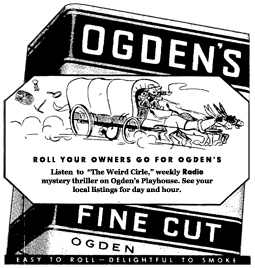 Nightfall is the title of a radio drama series produced and aired by CBC Radio from July 1980 to June 1983. While primarily a supernatural/horror series, Nightfall featured some episodes in other genres, such as science fiction, mystery, fantasy, and human drama. One episode was even adapted from a folk song by Stan Rogers. Some of Nightfall's episodes were so terrifying that the CBC registered numerous complaints and some affiliate stations dropped it. Despite this, the series went on to become one of the most popular shows in CBC Radio history, running 100 episodes that featured a mix of original tales and adaptations of both classic and obscure short stories.
Nightfall is the title of a radio drama series produced and aired by CBC Radio from July 1980 to June 1983. While primarily a supernatural/horror series, Nightfall featured some episodes in other genres, such as science fiction, mystery, fantasy, and human drama. One episode was even adapted from a folk song by Stan Rogers. Some of Nightfall's episodes were so terrifying that the CBC registered numerous complaints and some affiliate stations dropped it. Despite this, the series went on to become one of the most popular shows in CBC Radio history, running 100 episodes that featured a mix of original tales and adaptations of both classic and obscure short stories.
Nightfall was the brainchild of producer Bill Howell, who was best known at the time for his work on CBC Playhouse and the cult favorite adventure series, Johnny Chase: Secret Agent of Space. (Howell later went on to be executive producer of CBC Radio's highly-popular series, The Mystery Project, which ran from 1992 to 2004.) When CBC Radio was revamped and given an expanded budget in 1980, Howell approached the newly appointed head of radio drama, Susan Rubes, about his idea for a supernatural/horror anthology series that would push the envelope. Though not a fan of the horror genre, Rubes recognized a hit when she saw one and gave Howell the green light to begin production.
Bill Howell served as executive producer of Nightfall at CBC Toronto for the first two seasons. The reins were passed for the third season to veteran CBC Radio producer Don Kowalchuk (Doctor Bundolo's Pandemonium Medicine Show) at CBC Vancouver.
Nightfall featured two hosts during its run. The Toronto years (1980–1982) were hosted by "the mysterious Luther Kranst", a character created by Bill Howell's devious imagination and played by character actor Henry Ramer. For its Vancouver run (1982–1983), Don Kowalchuk worked with voice actor Bill Reiter to develop the character of Frederick Hende.
Nightfall episode plot summaries can be found here - http://www.otrplotspot.com/nightfall.html






